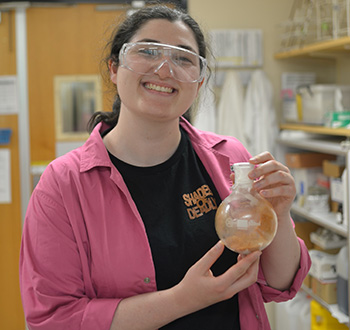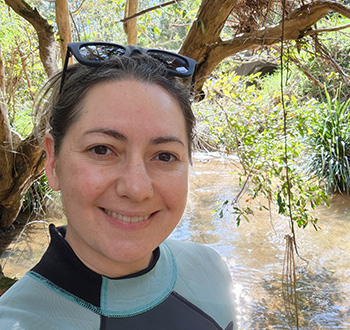Emerging Indigenous women scientists recognised with Academy award
- 3 mins read

Emerging scientists Michelle Hobbs and Stephanie Beaupark are the recipients of the 2023 Australian Academy of Science Aboriginal and Torres Strait Islander Scientist Award.
The award recognises research by outstanding Aboriginal and Torres Strait Islander PhD students and early- and mid-career scientists.
Ms Beaupark, an associate lecturer and PhD student at the University of Wollongong, will use the award to further her research, which combines her passions of chemistry and visual art.

Ms Beaupark explores the chemistry of native natural dyes. Photo: Corey Mantuano
She’s studying the colour chemistry of natural dyes from Australian native trees such as Eucalyptus cinerea and using an Indigenist methodology involving yarning with other Indigenous natural dye artists and weavers.
“I’m looking specifically at the eucalyptus dye used to make artworks and how the colourant compounds interact with the dye mixture to fix onto silk fabric and wool,” said Ms Beaupark, a descendant of the Ngugi people of Quandamooka Country.
“The aim of this project is to define how creative practice can build connections between chemistry and Indigenist ways of being and gaining knowledge.
“I hope the better integration of these knowledge systems will also allow us to better take care of Australia and create a sustainable future for textiles colourants and alternatives to mainstream artmaking materials.”
Ms Hobbs, who’s a Bidjara descendent and associate lecturer and PhD student at Griffith University, will use the award to provide new insights into the management of Australian freshwater ecosystems and freshwater mussels.

Ms Hobbs' research focus includes the cultural significance to Indigenous peoples of freshwater mussels.
Ms Hobbs said freshwater mussels are one of the most imperilled groups of animals.
“Extinctions or population declines of mussels are likely to disproportionately affect Indigenous peoples who use them, yet relatively little has been published about mussels from Indigenous perspectives or regarding the cultural values of mussels,” Ms Hobbs said.
“Current risk assessment methods and natural resource management tend to limit Indigenous involvement to cultural heritage objects or artefacts, while cultural values or uses of biota or landscapes are not explicitly addressed, despite their clear importance to Indigenous peoples.
“I hope this project will fill in some of the knowledge gaps in this area, within the broader context of my PhD research.”
Ms Hobbs will travel to Canada later this year to meet with First Nations researchers and discuss Indigenous uses and management of mussels, and the role of Indigenous values and communities in water management.
About the award
Established in 2018, the award recognises research in the physical and biological sciences, allowing interdisciplinary and sociocultural research straddling the social sciences and humanities.
It aims to support research and the growth of research networks and international knowledge exchange through visits to relevant international centres of research. Awards include up to $20,000, with additional support provided to attend the Academy's annual Science at the Shine Dome event.
The award is also part of the Academy’s work to champion diversity and inclusion in the sciences and empower the next generation of scientists. This will strengthen the voice of science and support scientific excellence.
Applications for the 2024 award open on 16 February. More information about the award.





